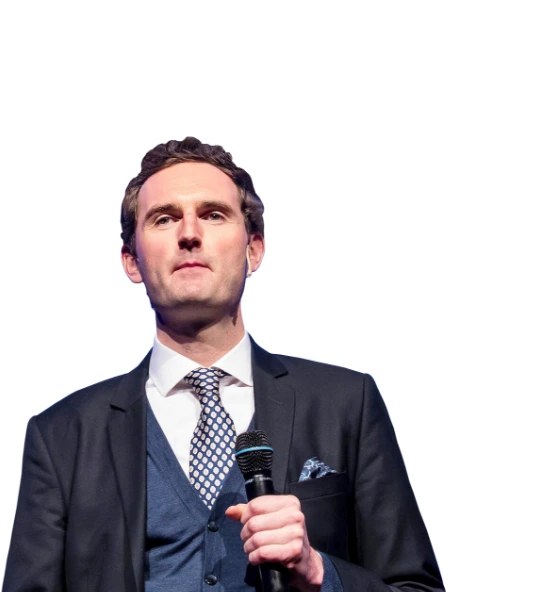Introduction:
A project's development cost depends on many components. However, the majority of the cost is made up of effort and time that are spent on the software. The software development cost can be divided into two categories: direct costs and indirect costs. Direct costs include the expenditure of the each offshore software developer, the cost of resources, hardware costs and other things that directly affect the cost of the software. While indirect costs include the cost of testing, security and quality checks, which are not directly addressed.
What is a Project Cost Estimation?
Project cost estimation is basically the first and most important process of calculating direct and indirect costs needed to complete the entire project. This includes time, resources, labor, and all other expenses and materials required to fulfill the project requirements.
In short, it includes everything from the design to the development phase i.e. research, strategy, copywriting, wireframing, printing, premium resources if needed, and soon.
Why Estimating Project Development Cost is important?
The straight answer is project cost estimation makes things easier for the project manager as well as the team to carry out the project development with proper planning by avoiding other conflicts and overspending of resources as well as money. Below are some of the reasons why project development is an undeniable point.
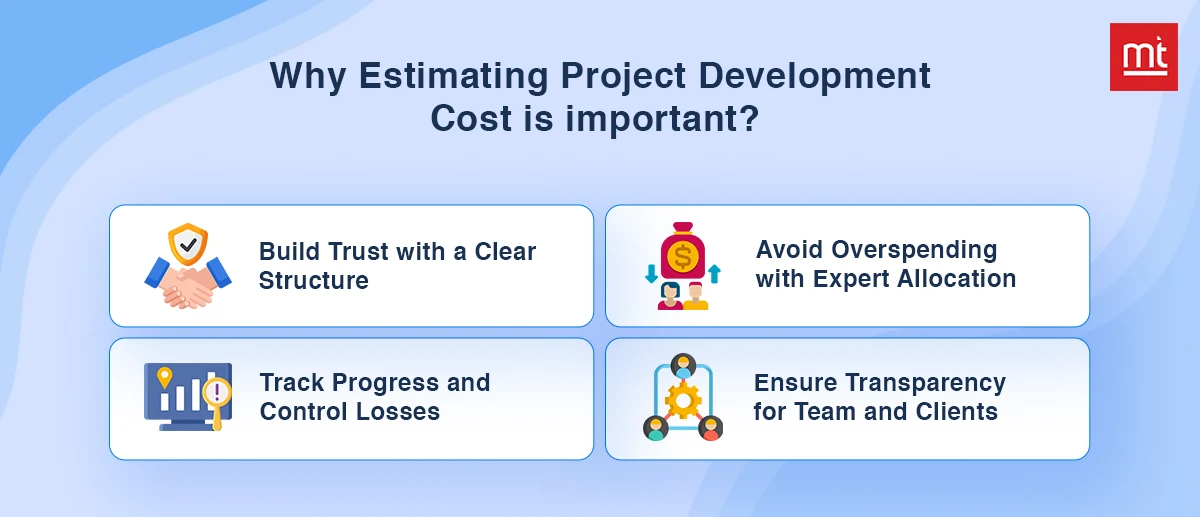
- Providing a clear project structure with costing and where resources are invested helps build trust and credibility between stakeholders and developers.
- It prevents overspending and time waste, as the planned project helps allocate the task and resources to suitable experts.
- It helps to track the project's progress and get an idea of financial losses.
- At the end, you can carry the project more transparently so there is confusion within the team and client.
Types of IT Project Cost Estimation Techniques
Every client comes with different projects so their cost estimation technique can also vary. Below are some of the Project Cost Estimation that will help you to understand the development costs better.
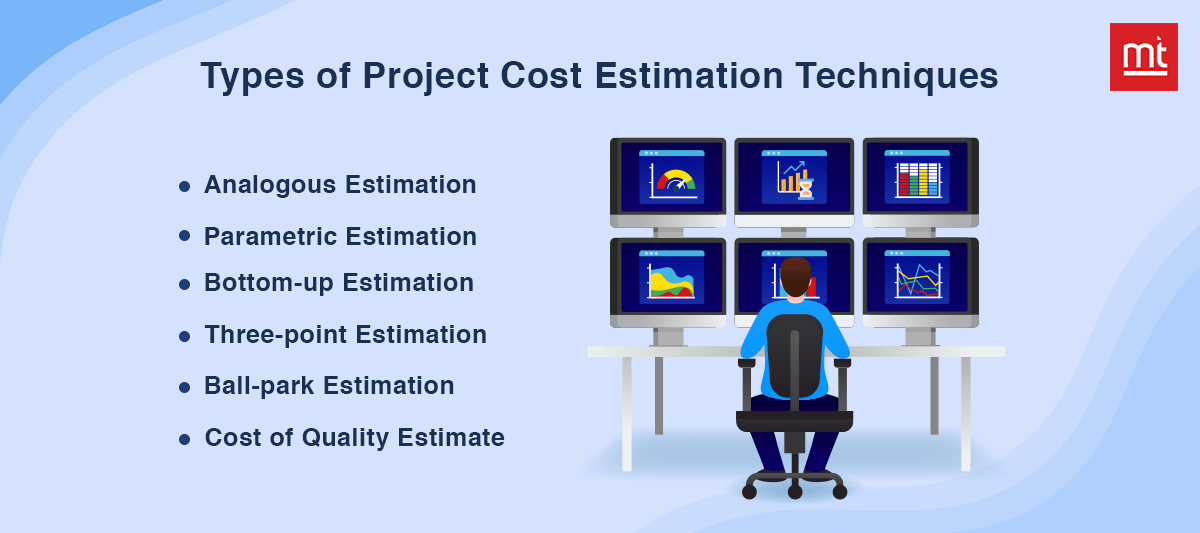
#1. Analogous Estimation Techniques
This is a simple and effective method to get a project development cost idea. It includes studying past similar projects or historical data from the market that has done similar projects.
Hence by looking at other’s projects, you can get an idea of what all resources were needed. What expertise is required, how much it costs overall, and many other details.
It will be a big benefit if you have an expert in the connection who has worked on that type of similar project.
#2. Parametric Estimation
This method is also based on historical data but here the cost is calculated based on certain parameters and data. It can give you accurate project cost estimation if you have enough past project data and other information.
#3. Bottom-up Estimating
Bottom-up is a granular method where every task of the project is divided into smaller granules. Here every individual of the team is assigned a particular task and then all the task’s cost is summed up together to get the final costing.
This method might seem time-consuming but you can get nearly accurate costing from this.
#4. Three-point Estimation
Three-point estimation means three scenarios are considered here that are optimistic, pessimistic, and realistic. Obviously, sometimes things do not go as we expected or planned.
Here three scenarios are considered, The first one is optimistic which is the best case, if everything goes as per the plan. The team uses resources as needed, proper involvement of the team, efforts, and other things.
The second case is pessimistic, that is the worst case, where the situation can fluctuate and things can work opposite which may have negative outcomes in the project.
Third is a realistic scenario, where everything goes smoothly but there might be some real challenges while working on the project but they are recoverable.
Hence by considering all three scenarios, the average cost is calculated by understanding how things can work out.
#5. Ball-park Estimation
Ballpark is useful when you are completely new to any project and have limited information. It gives a rough estimate but a high-level estimate to give the client an idea about the project cost.
It is useful when you are working with new clients and new industries, just to give clients an idea of whether they should proceed further or not.
#6. Cost of Quality Estimate
This method is applied after the project is done. It's basically the money spent throughout the project to run it smoothly and avoid failures, fixing unexpected issues, and more.
So this is the cost what client pays for the quality project and overall finetuning.
Key Factors That Affect the Project Development Cost
As mentioned, there are a number of things that can affect the cost of development. However, we are discussing some key components that make up a total development cost.
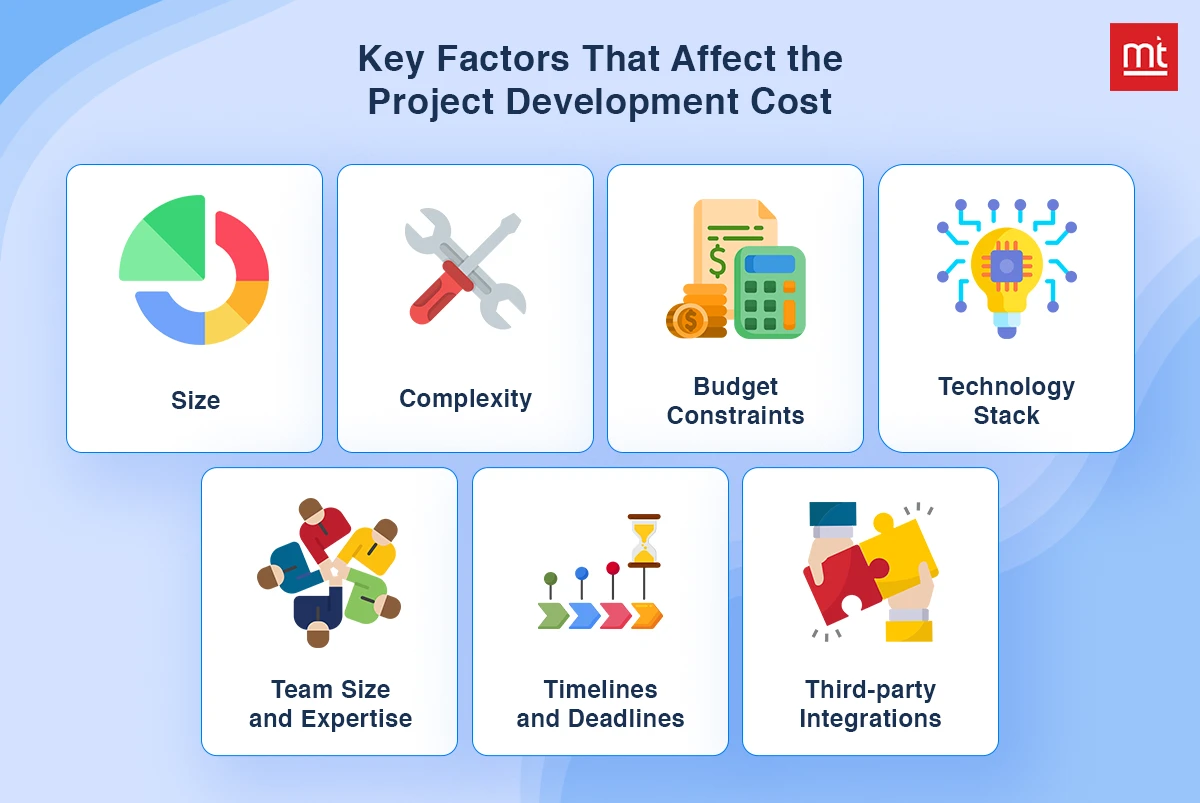
#1. Size
The size of the project is one of the major factors that can give you a rough idea of the cost. That’s simple: the more pages you demand, the more work will be done to develop those pages and the more you have to pay for the software. Pages are simply the interface that your users see when they tap on different elements through your software.
#2. Complexity
The complexity of the project includes the number of functionalities, design, coding, testing, integrating third-party apps, and so on. A simple app with fewer features will cost less than a complex app containing loads of features.
#3. Budget Constraints
You probably have a fixed budget that you would want to spend on the software. Define a budget and discuss it with your software development company along with the functionalities you wish to implement.
#4. Technology Stack
Logical and technically, the success of a project depends on the technology you use. Usually, advanced or niche-specific tech stacks might need specialized developers who charge more.
On the other hand, using less and older technologies leads to limited functionality and future maintenance costs. Hence always choose the programming languages, frameworks, and tools that fulfill your project functionality and cost both.
#5. Team Size and Expertise
If the project is large, it will need more experts with different skills. If the project requires specialized skills (like AI), it increases hourly rates. However, this is actually a benefit because the experienced and large team can easily complete the project faster, reducing overall costs.
#6. Timelines and Deadlines
This increases costs as there is a necessity for incurring overtime costs or bringing additional resources. It is expensive to rush through projects because of the higher effort that is required to complete tasks within a shorter time frame, leaving very little room for proper planning and execution.
#7. Third-party Integrations
Integrating external services such as payment gateways or application programming interfaces (APIs) leads to additional expenses. It can be in the form of software licensing costs, regular subscription payments, or even bespoke fitting-out services.
As you add more services from the outside, the costs associated with developing the solution and keeping it running as well go up.
Step-by-Step Guide to Estimate Project Development Cost
So, here is a step-by-step guide on how to develop cost estimates in a project smartly without spending much bucks.
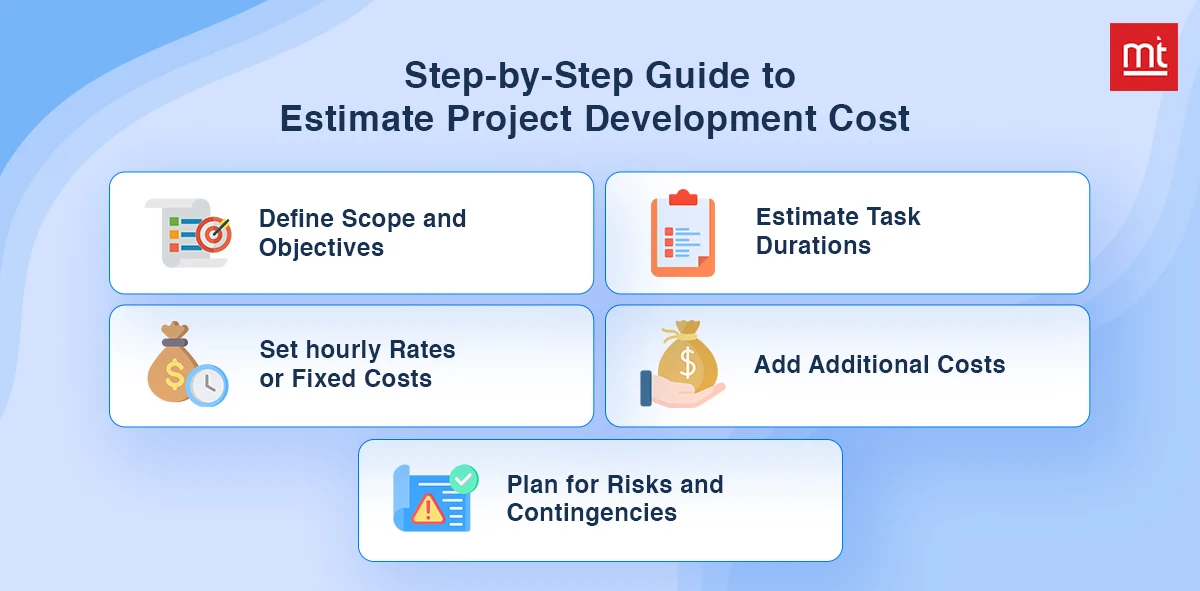
#1. Define Project Scope and Objectives
The very first thing, define the core features and requirements that the client’s business targets to achieve. This way, you will get half of the idea of estimation. Start work by breaking down the project modules, priority-wise. When you understand every module, you can calculate costing by adding up all in the end.
#2. Estimate the Time Required for Each Task
Once you have defined the project scope and modules ready, calculate the time it will take to complete each module i.e. development, design, testing, and deployment. Make sure you also include buffers, and the chances of issues to occur while working on suitable types of projects.
#3. Determine Hourly Rates or Fixed Costs
First, analyze which model will be suitable( hourly rate or a fixed fee). Hourly rates ar flexible but their fluctuation is directly associated with the level of expertise of the developer. Fixed costs offer a fair estimate of the budget but such cases may need accurate calculation.
#4. Account for Additional Costs
Beyond development, the budget for infrastructure like servers, hardware, software tools, and other things matters too. technological evolution is unpredictable so it's also important to note down ongoing maintenance, updates, and post-launch supports.
#5. Include Risk Management and Contingency Plans
Do research and identify possible risks, such as technical challenges or scope changes, and allocate a contingency budget (typically 10-15%). This helps you to safeguard against unforeseen issues.
Common Mistakes to Avoid in Project Cost Estimation
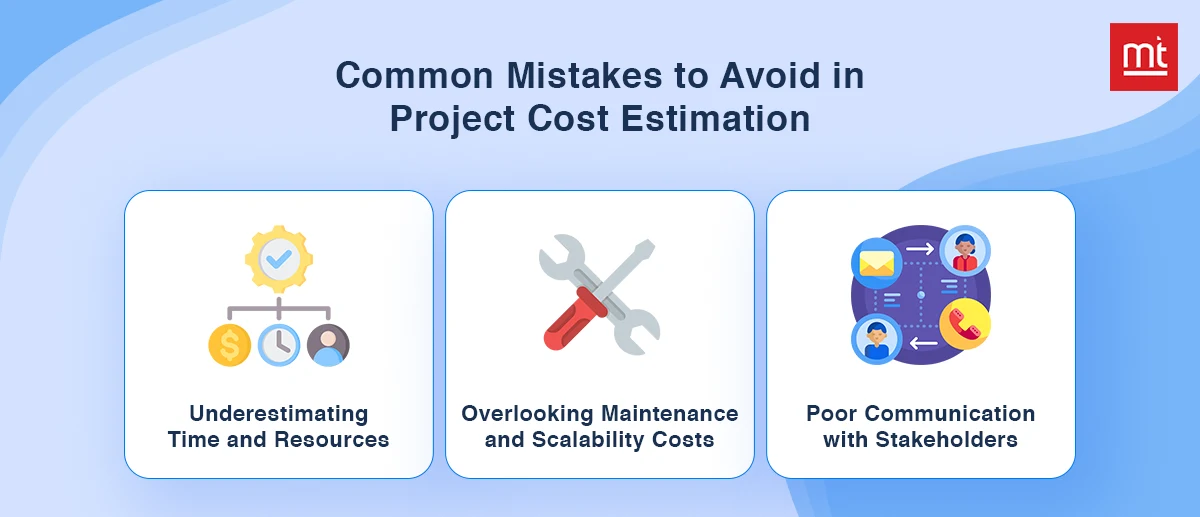
1. Underestimating the Time or Resources Needed
When you underestimate the time and resources, it adds more complexities to the task and keeps adding extra costs to fulfill the requirements. Hence you should never underestimate the time and resources you have, or else, it can have a negative impact on your company records.
2. Ignoring Maintenance and Future Scalability Costs
Always get your job done in advance. Consider future maintenance and support so there are no conflicts between you and the client. Also please have a detailed discussion if the clients have any future plans to scale the app or any add ons.
3. Failing to Communicate with Stakeholders for a Clear Project Vision
If stakeholders don’t fully agree on the project scope and vision, it can lead to changes, confusion, and increased costs. Make sure you discuss how the project is going to be done and what will be the result.
Some Useful Tools and Techniques for Accurate it project Cost Estimation
There are so many useful tools and tactics that can help you with project estimation. Below are some.
1. Project Management Tools
Use Software like Jira, Trello, or Asana to track tasks, time, and costs in real-time. This actually reduces a lot of confusion by giving clarity of work, helping better budgeting, while monitoring progress as needed.
2. Agile Methodology
Let's admit nothing is permanent, and technology evolves. Pick Agile methodology so, you can make continuous adjustments in project scope and costs. This also improves cost accuracy and adapts to changing requirements.
3. Expert Consultants
Invest in Hiring experienced consultants. This is totally worth it because he/she can provide valuable insights and accurate cost projections whenever you seek help. Their industry expertise helps to learn about hidden expenses to make sure you give realistic budgeting.
How Cost of Project Development is Calculated?
In order to successfully estimate the software development cost, it is necessary that it should be measured. Only a competent offshore custom software development company can provide budget estimating in the most efficient way. Here are some common approaches that can help you calculate the project development cost.
1. Involve Stakeholders
The involvement of the company’s stakeholders plays an important role in estimating the project cost. Urge them to share their vision with you. If they have some high-end expectations, let them know about the expected budget. Help them cut down unnecessary features and implement only important ones.
2. Be Clear With Your Ideas
Get a quick understanding of your client’s requirements, and determine what and how you are going to accomplish them. Assess the idea and come up with a viable solution that meets your client’s budget, expectations, timeline, and deliverables of the project so that it starts yielding results soon.
3. Break Project Into Deliverables
Once you get the idea of the project, divide it into several parts or deliverables. Now estimate the cost required to complete each task, so you can better estimate the total cost of the project.
4. Reevaluate Your Estimation with Team
With your project cost estimation sheet in hand, get it acquainted with your client, the project development team, and your project history to make sure you have a better idea of the budget, skill,s and experience required to accomplish the project.
5. Ask As Many Questions Possible
In order to be completely clear with every stage of the project, keep asking your team members how they can best deliver the project. Ask how and why. Asking questions will help you examine the estimate and discover hidden costs and assumptions.
6. Keep a Buffer for Unexpected Cost
Planned costs are never a concern. What may ruin your budget is unexpected expenses. Projects rarely go in accordance with the cost. So, be sure you are prepared with a budget for risk, amendments in project scope or schedule, and any other uncertainties that directly or indirectly affect the budget.
7. Take Hidden Expenses Into Account
Indirect costs can greatly impact your project. Be sure you consider a separate budget for project maintenance, labor costs, reporting, testing, invoicing, travel, and other costs that may arise unexpectedly during or post-project delivery.
8. Recheck Project Cost Twice
Don’t rush into providing the development cost. Review and recheck your budget list to ensure all the expenses, including direct and indirect costs are properly considered. Mistakes in evaluating the cost for exchange rates, tasks, and labor may turn out expensive.
9. Be Honest
Never offer under or over-estimation of the project, which may be stressful for you later in the development cycle. Try to be as accurate, honest, and straightforward as you can with the budget. It will make project development much more fruitful and build a strong rapport with your clients.
Conclusion
Getting a well-researched estimate of the project cost is not an easy task. But, being a well-established offshore application development company, ManekTech has a pool of project managers and developers, who can not only help in estimating accurate development cost but also help you execute your project in the best possible way.
About Author
Subscribe to Our Newsletter!
Join us to stay updated with our latest blog updates, marketing tips, service tips, trends, news and announcements!










